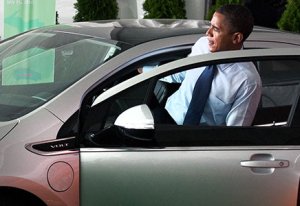 There’s an article you should read, even though many of you are going to hate it.
There’s an article you should read, even though many of you are going to hate it.
John DeCicco gets very blunt and criticizes the Obama Administration’s push for electric vehicles and alternative fuel vehicles – along with presidential programs going back to Ronald Reagan that he says were a waste of taxpayer’s money. Government subsidies and mandates haven’t worked, he says. He lambastes Obama administration policies, which are usually considered to be very green. He thinks that the policies are “under the misguided presumption that alternative fuels emit significantly fewer greenhouse gases than gasoline, and goaded by green groups and alternative fuel business interests.”
I do think you should take DeCicco and his article in a Yale University journal very seriously. He’s a noted academic researcher, has been a senior fellow at Environmental Defense Fund, and he pioneered US green car ratings for the American Council for an Energy-Efficient Economy.
He thinks the best way to go will need a three-prong strategy: 1. Continue to raise fuel economy standards. 2. Implement policies that will reduce driving. 3. Control carbon upstream in energy and fuels used downstream in our daily lives.
As for the upstream/downstream argument, he thinks much of it boils down to the source of the energy. DeCicco makes the classic argument about the downside of EVs. About two thirds of the electricity that powers plug-in electric vehicles comes from fossil fuels – coal and natural gas – which removes the good side of EVs. Carbon emissions need to be cut down at electricity power plants – although he does acknowledge that this is included in Obama’s new climate plan.
And, of course, he rips into biofuels: “Similarly, for biofuels such as ethanol, any potential climate benefit is entirely upstream on land where feedstocks are grown. Biofuels have no benefit downstream, where used as motor fuels, because their tailpipe CO2 emissions differ only trivially from those of gasoline,” he wrote.
He’s painting a picture that can be bleak and depressing. At the end of the day, stakeholders in this field must stay well informed and effectively get the word out on their green transportation campaigns. That requires adopting strategies that have a good chance of accomplishing their intended goals. Using hybrids and highly fuel-efficient vehicles is part of reducing emissions. Natural gas, electricity, propane autogas, ethanol, biodiesel, and hydrogen – in their current realities – are far from perfect or ideal. You could think of it as “transitional fuels” that are a step forward away from petroleum and have their role to play in reducing carbon emissions, job creation and economic growth, and curing our addiction to oil. Electricity made from 100% renewables, algae and cellulosic biofuels, renewable natural gas, and hydrogen extracted from clean sources, are targets to aim for – but they’re still a long ways off.



